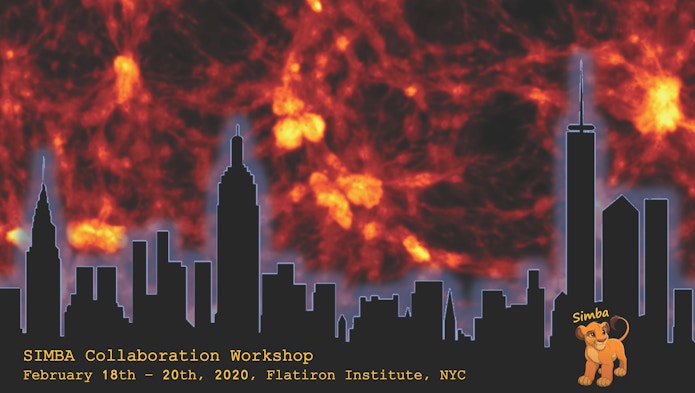
Join co-organizers Daniel Anglés-Alcázar and Romeel Davé in the first annual SIMBA Collaboration Workshop held at the Flatiron Institute in New York City on February 18th – 20th, 2020.
The SIMBA large volume cosmological simulations represent a significant step forward in modeling statistical populations of galaxies with state-of-the-art hydrodynamics and realistic sub-grid baryonic physics based on higher resolution calculations. The goal of the workshop is to discuss ongoing work with the SIMBA simulations, coordinate existing projects, and make plans for future work. We would like to promote the exchange of ideas, tools, and knowledge between subgroups working on different aspects of galaxy formation and cosmology. We anticipate that the workshop will include a mix of talks and ample discussion time, along with breakout sessions for more in-depth collaborations.
Please register for the workshop and indicate your planned dates of attendance and any dietary restrictions. There is no workshop registration fee and breakfast/lunch/breaks are generously provided by the Center for Computational Astrophysics (CCA), Flatiron Institute, which is hosting the workshop. Workshop participants are welcome to stay at the CCA on Friday February 21st for free collaboration time.
Further information regarding the workshop program and logistics will follow soon. Meanwhile, please feel free to send us any questions regarding the workshop.
Organized by:
Daniel Anglés-Alcázar
Associate Research Scientist, Flatiron Institute CCA
Assistant Professor of Physics, University of Connecticut
Romeel Davé
Chair of Physics, The University of Edinburgh
-
Tuesday, February 18th
Math for America Building 8:30 - 9:30am Breakfast 9:30 - 10:00am Welcome & Simba status report - Romeel Davé 10:00 - 10:20am Black hole growth modes and feedback in Simba - Daniel Anglés-Alcázar 10:20 - 10:40am Radio AGN in SIMBA - Nicole Thomas 10:40 - 11:00am Simba: on the scatter of galaxy formation - Weiguang Cui 11:00 - 11:30am Coffee break 11:30 - 11:50am Galaxy evolution in the metric of the cosmic web - Katarina Kraljic 11:50 - 12:10pm Galaxy profiles in green valley galaxies - Sarah Appleby 12:10 - 12:30pm Star formation histories in SIMBA and MUFASA - Kartheik Iyer 12:30 - 12:50pm Angular momentum in MANGA and hydro simulations - Chris Duckworth 12:50 - 1:10pm Mergers and quenching in Simba - Francisco Rodriguez Montero 1:10 - 2:00pm Lunch 2:00 - 2:15pm Ground truthing SED fitting methods in galaxy observations - Sidney Lower 2:15 - 2:30pm Modeling nebular line emission (using BPT diagrams as a test case) - Prerak Garg 2:30 - 2:45pm Dust content in the SIMBA simulations - Qi Li 2:45 - 3:00pm Lyman alpha blobs in cosmological simulations - Benjamin Kimock Move to CCA 3:00-3:30 Coffee break 3:30 - 4:00pm Analysis tools overview 4:00 - 4:30pm Group discussion on tools, repositories 4:30 - 5:30pm Hack time 5:30pm Reception and group dinner Wednesday, February 19th
Math for America Building 8:30 - 9:30am Breakfast 9:30 - 9:50am SIMBA in far-infrared emission with SIGAME - Karen Pardos Olsen 9:50 - 10:10am FIR fine-structure lines in the first galaxies - Daisy Leung 10:10 - 10:30am Photometric properties of EoR galaxies in Simba - Xiaohan Wu 10:30 - 10:50am Rapid early coeval SF and assembly of massive galaxies- Douglas Rennehan 10:50 - 11:10am SMG Predictions from SIMBA - Christopher Lovell 11:10 - 11:40am Coffee break 11:40am - 12:00pm Cold gas properties in Simba vs Eagle vs TNG - Romeel Davé 12:00 - 12:20pm The effect of AGN feedback on the properties of z~2-3 CGM - Daniele Sorini 12:20 - 12:40pm What can DLAs tell us about galaxy formation? - Sultan Hassan 12:40 - 1:00pm Circumgalactic medium in Simba - Sarah Appleby 1:00 - 2:00pm Lunch 2:00 - 3:00pm Project discussion/organization and wiki update (Romeel Davé) Move to CCA 3:00 - 3:30pm Coffee break 3:30 - 5:00pm Hack time Thursday, February 20th
Math for America Building 8:30 - 9:30am Breakfast 9:30 -9:50am Marginalizing over baryon effects - Francisco Villaescusa-Navarro 9:50 - 10:10am Taranis: GPU-accelerated cosmological radiative transfer- Gennaro Di Pietro 10:10 - 10:30am SWIFT: Scaling cosmological simulations - Josh Borrow 10:30 - 10:40am Inter-lagrangian transfer in SIMBA - Josh Borrow 10:40 - 11:00am SIMBA and 2020s large-scale structure - Michael Wilson 11:00 - 11:30am Coffee break 11:30am - 1:00pm Future projects discussion, hack time 1:00 - 2:00pm Lunch -
Name Institution Daniel Angles-Alcazar CCA Sarah Appleby University of Edinburgh Josh Borrow ICC, Durham University Joanne Cohn UC Berkeley Weiguang Cui IfA, university of Edinburgh Ruth Daly CCA/Penn State University Romeel S. Davé University of Edinburgh Ana Maria Delgado New York City College of Technology- CUNY Gennaro Di Pietro University of Edinburgh Claire Dickey Yale University Chris Duckworth CCA / University of St Andrews Prerak Garg University of Florida Sultan Hassan New Mexico State University Kartheik Iyer Dunlap Institute, University of Toronto Benjamin Kimock University of Florida Katarina Kraljic University of Edinburgh T. K. Daisy Leung CCA Qi Li University of Florida Christopher Lovell University of Hertfordshire Sidney Lower University of Florida Ariyeh Maller CUNY Francisco Rodriguez Montero Institute of Astronomy, Cambridge Bhawna Motwani CCA Renan Alves de Oliveira CCA Karen Pardos Olsen University of Arizona Douglas Rennehan University of Victoria Daniele Sorini Institute for Astronomy, University of Edinburgh Rachel Somerville CCA Nicole Thomas University of the Western Cape Stephanie Tonnesen CCA Francisco Villaescusa-Navarro Princeton University Martin White UC Berkeley Michael Wilson LBNL Xiaohan Wu Harvard CfA